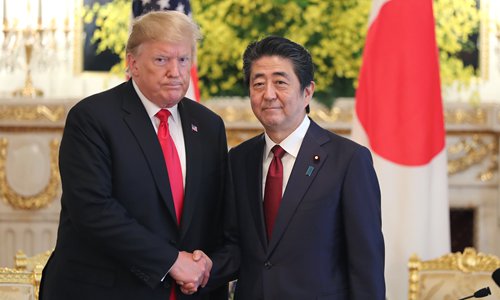HOME >> OPINION
Is the sun setting on the US-Japan alliance?
By Chen Yang Source:Global Times Published: 2019/8/20 20:38:40

Photo: IC
The US plans to send Vice President Mike Pence to Japan in October to attend the coronation of Japanese Emperor Naruhito, according to media reports. Pence is likely to meet Japanese Prime Minister Shinzo Abe during the tour to reaffirm the US-Japan alliance.
US President Donald Trump administration's high-ranking officials frequently reaffirming the importance of the alliance shows that relations between Washington and Tokyo are floundering.
In 1951, representatives from the two governments signed the Treaty of Mutual Cooperation and Security Between the United States and Japan in San Francisco, giving birth to their alliance.
Japan and the US were enemies during the WWII. Neither of them thought they could become allies later. Even more unexpectedly, their alliance lasts until today. Since the formation of their alliance more than six decades ago, there have been constant disputes within the relationship, including a trade war and the issue of US military bases in Japan. However, the alliance has not suffered much, and the risks have been controllable.
Meanwhile, the significance of their alliance has increased. After the WWII, the purpose of their relationship was to contain the Soviet Union. After the Soviet Union disintegrated in 1991, Japan and the US drifted apart for a brief period, but their ties were strengthened soon afterward.
In the two decades after the Cold War, the US-Japan alliance experienced three significant adjustments. It went from a defense-oriented relationship to one that deals with the situation in areas surrounding Japan, then shifted focus to supposedly maintaining global peace and security.
Japan's status has risen within the alliance, and the mutual trust between the two has also deepened. Under such circumstances, the Abe administration has been proactively implementing the US-initiated rebalance to Asia-Pacific strategy and Indo-Pacific Strategy. As the US strength is believed to be declining, it is anticipated that Japan's status in the alliance will continue to rise. But Japan and US relations span an unequal friendship.
Since Trump took office in 2017, a series of US moves and diplomatic policies have hurt US-Japan ties.
The Trump administration has withdrawn from a number of international organizations. This has made Japan feel that the US is no longer reliable. After Trump was sworn in, he pulled the country out of the Trans-Pacific Partnership. Later, the US withdrew from the 2015 Paris Agreement, UNESCO, the UN Human Rights Council, Iran nuclear deal, the Universal Postal Union, and the Intermediate-Range Nuclear Forces Treaty. Such behavior reflects the "America First" policy and damages trust among its allies, especially Japan.
According to a joint survey by the Yomiuri Shimbun and the US survey firm Gallup, which was released on December 2018, 30 percent of Japanese respondents said they trusted the US, the lowest figure since 2000. Meanwhile, 39 percent of Japanese respondents said Japan-US relations were "good" or "very good," a 17 percent decrease from 2017. Japanese mistrust for the US is rising, and doubts have emerged over the US role within the alliance - if Japan suffers a military attack, would the Trump administration, which has been promoting "America First," step up and offer help?
On the other hand, Trump's statements on the Japan-US trade deficit and their security treaty have caused concerns within Japan over whether their alliance can remain stable. During Trump's presidential campaign, he repeatedly expressed discontent with the trade deficit.
Washington will likely pile more pressure on Tokyo during trade talks. Trump has directly asked Abe to buy farm products worth a "huge amount," Kyodo news agency reported on August 13.
To deal with the trade deficit, the Abe administration has already purchased significant numbers of US-made jet fighters and weapons. Now, the US is forcing Japan to purchase its agriculture products, which shows that the US is bullying its Asian ally. Meanwhile, it was recently reported that Trump is considering scrapping the security treaty with Japan because he feels it is unfair to the US. Although the US government denied the news, the reports have cast a shadow on the alliance.
The US-Japan alliance is no longer as solid as what others have imagined. Although the two will not break up in the near future, whether they can do away with wobbly ties will influence the development of their alliance.
Japan and the US may again drift apart just as they did after the Cold War. This time, the estrangement won't come about because the two lack a common enemy, but because the US has participated less in global affairs and its moves have hurt international order. That being said, the US-Japan alliance lacks significance to exist.
The visit by Pence and other high-ranking US officials may help pacify Japan, but that's it. Consolidating the Japan-US alliance will take time and efforts.
The author is an editor at the Global Times and a Japan watcher. opinion@globaltimes.com.cn
RELATED ARTICLES:
Posted in: ASIAN REVIEW